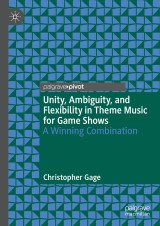Details
Unity, Ambiguity, and Flexibility in Theme Music for Game Shows
A Winning Combination|
42,79 € |
|
| Verlag: | Palgrave Macmillan |
| Format: | |
| Veröffentl.: | 30.04.2024 |
| ISBN/EAN: | 9783031468063 |
| Sprache: | englisch |
Dieses eBook enthält ein Wasserzeichen.
Beschreibungen
With flashing lights, bright colors, and big money, game shows have been an integral part of American culture since the days of radio. While the music that accompanies game shows is charming and catchy, it presents two unique, opposing challenges: first, it must exhibit unity in its construction so that, at any point and for any length of time, it is a tuneful, recognizable signifier of the show to which it belongs; at the same time, it must also possess the ability to be started and stopped according to the needs of gameplay without seeming truncated. This book argues that game show music, in particular from 1960 to 1990, deploys a variety of shared techniques in order to manage these two goals, including theme-derived vamps; saturation of motivic material; and harmonic, rhythmic, and formal ambiguity. Together, these techniques make game show themes exciting, memorable, and perfectly suited to their role.<br>
Chapter 1: Introduction.- Chapter 2: Creating Unity Through Thematic Repetition and Saturation.- Chapter 3: Creating Ambiguity through Metrical, Formal, and Harmonic Disruptions.- Chapter 4: Bonus Round: Nostalgia and the Reboot.- Chapter 5: Conclusion.
Christopher Gage holds doctorates in music theory and organ performance from the University of Kansas. His research is wide-ranging, from keyboard repertoire before 1700 to twentieth-century game show music. Chris is Director of Music at Overbrook Presbyterian Church in Philadelphia and currently teaches music theory at the University of Delaware.<br>
<p>With flashing lights, bright colors, and big money, game shows have been an integral part of American culture since the days of radio. While the music that accompanies game shows is charming and catchy, it presents two unique, opposing challenges: first, it must exhibit unity in its construction so that, at any point and for any length of time, it is a tuneful, recognizable signifier of the show to which it belongs; at the same time, it must also possess the ability to be started and stopped according to the needs of gameplay without seeming truncated. This book argues that game show music, in particular from 1960 to 1990, deploys a variety of shared techniques in order to manage these two goals, including theme-derived vamps; saturation of motivic material; and harmonic, rhythmic, and formal ambiguity. Together, these techniques make game show themes exciting, memorable, and perfectly suited to their role.</p>
<p><b>Christopher Gage</b> holds doctorates in music theory and organ performance from the University of Kansas. His research is wide-ranging, from keyboard repertoire before 1700 to twentieth-century game show music. Chris is Director of Music at Overbrook Presbyterian Church in Philadelphia and currently teaches music theory at the University of Delaware.</p><br>
<p><b>Christopher Gage</b> holds doctorates in music theory and organ performance from the University of Kansas. His research is wide-ranging, from keyboard repertoire before 1700 to twentieth-century game show music. Chris is Director of Music at Overbrook Presbyterian Church in Philadelphia and currently teaches music theory at the University of Delaware.</p><br>
Studies the composition of famous TV game show theme songs Identifies key compositional features TV game show theme songs must have to function successfully in this unique context Advances the study of game music into a ubiquitous but under-studied medium
Diese Produkte könnten Sie auch interessieren:

Flow, Gesture, and Spaces in Free Jazz

von: Guerino Mazzola, Mathias Rissi, Paul B. Cherlin, Nathan Kennedy

53,49 €

Deutscher Rap - Eine Kunstform als Manifestation von Gewalt?

von: Martin Wiegel, Volker Wehdeking, Gunter E. Grimm

19,99 €















